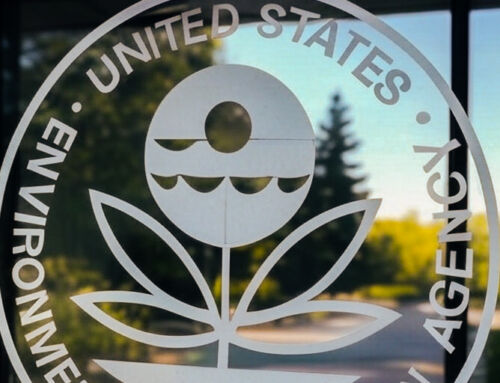View by Topic
Recent Articles
-
Greenpeace Ordered to Pay $667M in Legal Blow to Environmental ActivismSaturday, March 22nd, 2025
-
The Most Consequential Day of Environmental Deregulation in American HistorySaturday, March 15th, 2025
-
States Challenge Validity of New York’s Climate Change Superfund ActSaturday, March 8th, 2025
-
House Votes to Protect the Hot Water Heater in Your HouseSaturday, March 1st, 2025
-
EPA Transmits California Electric Vehicle Waivers to Congress for RepealSaturday, February 22nd, 2025
View by Month/Year
“Green Building Law Update” Headlines
Recent Articles & News from
Stuart Kaplow’s blog
at GreenBuildingLawUpdate.com
- Greenpeace Ordered to Pay $667M in Legal Blow to Environmental Activism March 23, 2025
- The Most Consequential Day of Environmental Deregulation in American History March 16, 2025
- States Challenge Validity of New York’s Climate Change Superfund Act March 9, 2025
- House Votes to Protect the Gas Water Heater in Your House March 2, 2025
Subscribe to the Green Building Law Update!
Stuart Kaplow brings his expertise and extensive experience to the table with his unique digital publication, "Green Building Law Update". Subscribers receive regular updates to keep them informed about important issues surrounding Environmental Law, Green Building & Real Estate Law, as well as the emerging demand for Environmental Social Governance (ESG).
Get fresh content through the lense of Stuart Kaplow's cutting-edge expertise, innovative commentary and insider perspective. Don't miss another issue! Subscribe below.

Solar Powered Advertisement is Deceptive
A business installs photo voltaic panels on its roof to generate power, and advertises that it is “solar powered.” The business, however, sells the Renewable Energy Certificates (RECs) that are generated by the solar power. Even if the business is near net zero for electricity generated by the solar panels, according to guidance from the Federal Trade Commission; it has, by selling RECS, transferred the right to characterize that electricity as renewable. The businesses’ claim is therefore deceptive.
This law firm is regularly asked about advertising claims for environmental matters, including most often issues of renewable energy.
While no two situations are the same and legal queries are always fact specific, many of the answers to questions about environmental marketing claims are found in the FTC’s Green Guides. The Green Guides help marketers avoid making environmental marketing claims that are unfair or deceptive under Section 5 of the FTC Act, 15 U.S.C. § 45. They do not operate to bind the FTC, other governments or the public, and are not legal advice, but they are characterized as the current thinking of the FTC.
So, with apologies to the FTC, but there is no better way to communicate the thinking of the federal government than to quote extensively from the Green Guides, including examples published in the Guides,
If a marketer generates renewable electricity but sells renewable energy certificates for all of that electricity, it would be deceptive for the marketer to represent, directly or by implication, that it uses renewable energy.
Example 1: A marketer advertises its clothing line as “made with wind power.” The marketer buys wind energy for 50% of the energy it uses to make the clothing in its line. The marketer’s claim is deceptive because reasonable consumers likely interpret the claim to mean that the power was composed entirely of renewable energy. If the marketer stated, “We purchase wind energy for half of our manufacturing facilities,” the claim would not be deceptive.
Example 2: A company purchases renewable energy from a portfolio of sources that includes a mix of solar, wind, and other renewable energy sources in combinations and proportions that vary over time. The company uses renewable energy from that portfolio to power all of the significant manufacturing processes involved in making its product. The company advertises its product as “made with renewable energy.” The claim would not be deceptive if the marketer clearly and prominently disclosed all renewable energy sources. Alternatively, the claim would not be deceptive if the marketer clearly and prominently stated, “made from a mix of renewable energy sources,” and specified the renewable source that makes up the greatest percentage of the portfolio. The company may calculate which renewable energy source makes up the greatest percentage of the portfolio on an annual basis.
Example 3: An automobile company uses 100% non-renewable energy to produce its cars. The company purchases renewable energy certificates to match the non-renewable energy that powers all of the significant manufacturing processes for the seats, but no other parts, of its cars. If the company states, “The seats of our cars are made with renewable energy,” the claim would not be deceptive, as long as the company clearly and prominently qualifies the claim such as by specifying the renewable energy source.
Example 4: A company uses 100% non-renewable energy to manufacturer all parts of its product, but powers the assembly process entirely with renewable energy. If the marketer advertised its product as “assembled using renewable energy,” the claim would not be deceptive.
Example 5: A toy manufacturer places solar panels on the roof of its plant to generate power, and advertises that its plant is “100% solar-powered.” The manufacturer, however, sells renewable energy certificates based on the renewable attributes of all the power it generates. Even if the manufacturer uses the electricity generated by the solar panels, it has, by selling renewable energy certificates, transferred the right to characterize that electricity as renewable. The manufacturer’s claim is therefore deceptive. It also would be deceptive for this manufacturer to advertise that it “hosts” a renewable power facility because reasonable consumers likely interpret this claim to mean that the manufacturer uses renewable energy. It would not be deceptive, however, for the manufacturer to advertise, “We generate renewable energy, but sell all of it to others.”
Of note, with the very expansive FTC definition of who is a consumer, many of the environmental claims that this law firm reviews are within documents drafted for other businesses or for government; not what many think of as advertising to consumers.
The current Green Guides were revised in 2012. The guidance they provide does not rise to being the rule of law, but assist businesses, in concert with their legal counsel, avoid making environmental claims that mislead and expose businesses to jeopardy.
If this law firm can assist you in finding the words or correctly advertising an environmental project, to advantage that work while mitigating any risk associated with the claims, do not hesitate to give Stuart Kaplow a call.









